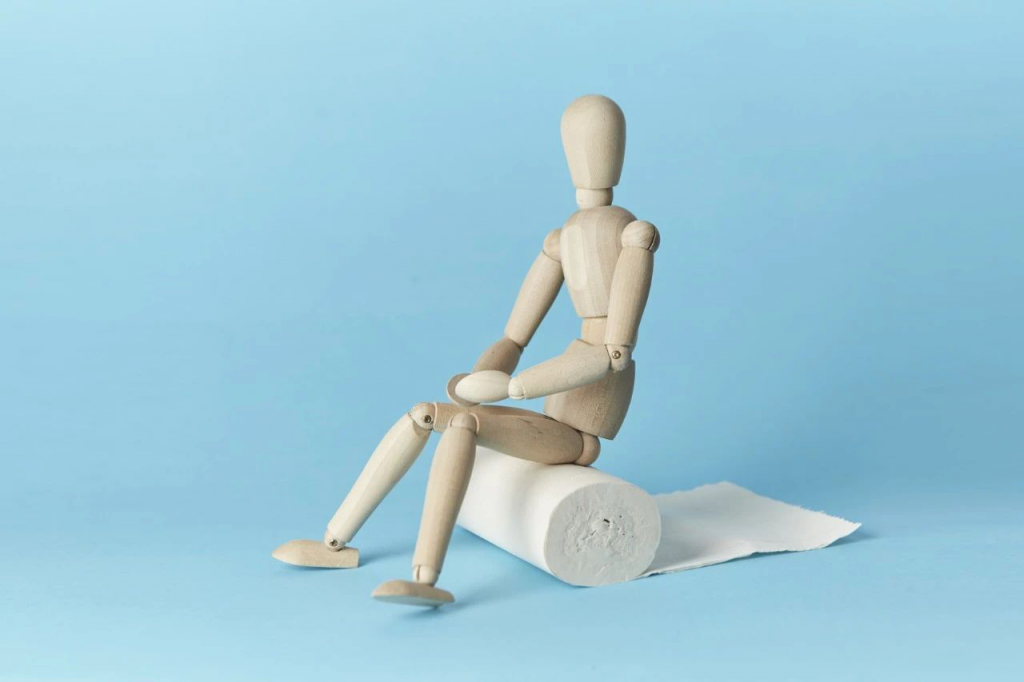
For some people, defecation is not an easy task: sitting on the toilet with frowning brows, bulging belly but helpless, running into the toilet several times a day.
In order to let the intestines “unload” quickly, you may riveted enough, but did not realize that the danger is quietly approaching you.

Defecation forcefully, burdening the heart
Throughout the ages, many people have died of defecation:
“Zuo Zhuan” records that in the Spring and Autumn Period, Jin Jinggong “will eat, go up, go to the toilet, sink and die”;
In 1760, King George II of England defecated too hard and had a heart attack.
In 1796, the Russian Empress Catherine II fell into unconscious while defecation and then died;
Crosstalk master Ma Ji died suddenly on the toilet one morning.
Data from the Centers for Disease Control and Prevention in the United States show that about 235,000 people in the United States are sent to the emergency room each year due to accidents in the bathroom.
A clinical study conducted by Beijing Anzhen Hospital affiliated to Capital Medical University found that ventricular free wall rupture is a fatal complication after acute myocardial infarction. Defecation, activity, emotional agitation, and overeating are the main causes of ventricular free wall rupture. Incentives. Forced defecation accounted for the highest proportion, reaching 37.9%.
For heart disease patients, forced defecation is a very dangerous factor for inducing myocardial infarction.
When people hold their breath and defecate forcefully, all organs of the body are “tensed”, especially the abdomen, which will lead to an increase in abdominal pressure, which will increase the amount of blood returned to the heart, increase blood pressure, and increase myocardial oxygen consumption. Myocardial ischemia, angina pectoris or severe arrhythmia, and even sudden death.
In addition, patients with cerebrovascular disease and poorly controlled hypertension may have a stroke when defecation forcefully.
With the advent of autumn and winter, the climate becomes dry, the temperature drops, and the body’s water is insufficient, which can easily lead to dry knot and cause constipation. Therefore, it is recommended that you do not use too much force when you defecate.
Five guidelines for healthy bowel movements
Defecation is a technical task, neither too hard nor too long. Scientific defecation, to master the following requirements.
Frequency of defecation
Xu Zhijie, deputy chief physician of the Department of Gastroenterology, Peking University Third Hospital, said that one bowel movement in two or three days or one to three times a day is considered normal. Many people often defecate after meals. This is because the gastrointestinal peristalsis accelerates and produces gastro-colon reflex, which makes people feel defecation.
Zheng Lihua also believes that one to two bowel movements a day is ideal. Generally, no more than three times a day is normal, but this is not the only indicator of gastrointestinal health. The character and color of stool, as well as people’s own feelings are also important.

Defecation Time
According to clinical observations, most Chinese people are used to defecate in the morning. Because people will have a standing reflex after getting up in the morning, and the stomach and colon reflex is the strongest after breakfast, which will stimulate colon peristalsis and form a bowel reflex. At this time, going to the toilet can empty the “waste” produced by metabolism throughout the night and help prevent anorectal diseases.
It is recommended to go to the bathroom after getting up, or to have a defecation 20 minutes after breakfast.
Do not hold back if you have a bowel movement in the usual way to avoid constipation caused by the disappearance of conditioned reflex.
Defecation duration
Be attentive when going to the toilet, don’t read a book or play with your mobile phone. Doing one mind and two will distract your attention and reduce the precise control of the anal muscles, which may induce constipation over time. Each time you squat in the toilet should be controlled at 10 minutes. If you have not discharged after more than 10 minutes, don’t force it.
Squatting in the toilet for too long will cause the sphincter to be congested, form varicose veins, and attract hemorrhoids, especially the elderly. After standing up, the blood supply will suddenly surge, causing dizziness and fainted.
Therefore, if it is difficult for the elderly to solve the problem within 10 minutes, they can stand up and then sit down, interval time, and never squat for half an hour at a time.
Toilet selection
Generally speaking, when squatting, the muscles around the anus relax and the abdominal pressure increases, which will help smooth defecation. When sitting, the height of the toilet should be half-flexed with the thighs. If the height is not enough, a low stool can be placed under the feet.
Compared with sitting, abdominal pressure will be greater when squatting. For people with cardiovascular and cerebrovascular diseases, it is best to sit and go to the toilet. If the toilet is installed at home, you might as well put a small stool under your feet when you have a bowel movement, and lean your upper body slightly forward, which is more conducive to defecation, and you should get up slowly after the discharge.
Especially some patients with orthostatic hypotension who suddenly get up after squatting can easily cause the brain’s short blood supply and cause the eyes to turn black. When you get up, you can hold the support to prevent fainting.
Defecation colour
Normal stools are formed and yellow.
If there is a small amount of fresh blood on the surface, it is mostly a manifestation of hemorrhoids. If the stool shows three colors of black, red, and white, you must be vigilant.
When the amount of bleeding in the intestine is small and slow, the blood stays in the intestine for a long time, and the stool discharged is mostly black;
If the amount of bleeding is heavy, the blood stays in the intestine for a short time, and the excretion of stool is red;
“White” means the color of clay, which may be caused by obstruction of the biliary tract caused by liver and gallbladder and pancreatic diseases, causing poor bile secretion, resulting in pale stools.
Do not worry too much about occasional stool color abnormalities. You can recall whether there are special circumstances in the near future, such as eating certain foods or drugs, such as blood iron, oral activated carbon powder, excessive intake of vegetables or receiving antibiotics, which may cause stool color change.
5 good habits to make bowel movements smooth
Unsmooth defecation can not only cause anorectal diseases, but also cause cancer. The US “Prevention” magazine website counts 5 good habits developed by people with smooth bowel movements.
Drink plenty of water when traveling
Some people have normal bowel movements at home, and their good habits are disrupted when they go out.
The chief gastroenterologist at Princeton University Medical Center, Dr. Anish Shess, explained that when people travel through different time zones, it will affect the circadian rhythm, which will lead to gastrointestinal dysfunction and cause constipation. Drinking a lot of water can help maintain Gastrointestinal exercise.

Fixed Schedule
Studies have shown that most people with smooth bowel movements defecate at the same time every day. Irregular bowel times can cause chronic constipation. When the stool stays in the colon for too long, it will become dry and hard, making it more difficult to expel.
Moderate exercise
Moderate exercise helps to keep the stool smooth, but if you exercise too much, the body will flow blood from the intestine to the muscles, which slows down the movement of the digestive tract. In addition, if the amount of exercise is not up to standard, the activity of the digestive tract will also be weakened.
It is recommended to exercise for no less than 30 minutes a day. Young people can do more intense exercises, such as mountain climbing, running and various ball sports. Middle-aged and elderly people can choose to jog. For the elderly, brisk walking and walking are best.
Yoga exercise
Stress and anxiety slow down the contraction of intestinal muscles and cause constipation. Studies have shown that yoga exercise can help reduce the symptoms of irritable bowel syndrome (including diarrhea and constipation). Physical activity can move the stomach and intestines, and yoga can help reduce stress.
Take laxatives carefully
If you take laxatives regularly, your body will become addicted to these drugs, the effect is not obvious, and it will cause harm to the body. You can try taking drugs such as lactulose to increase the volume of the colon and relieve constipation by osmosis.
Taking probiotics can also help relieve constipation, because it can replenish good bacteria in the intestines and help keep the gastrointestinal tract running well.
Comments